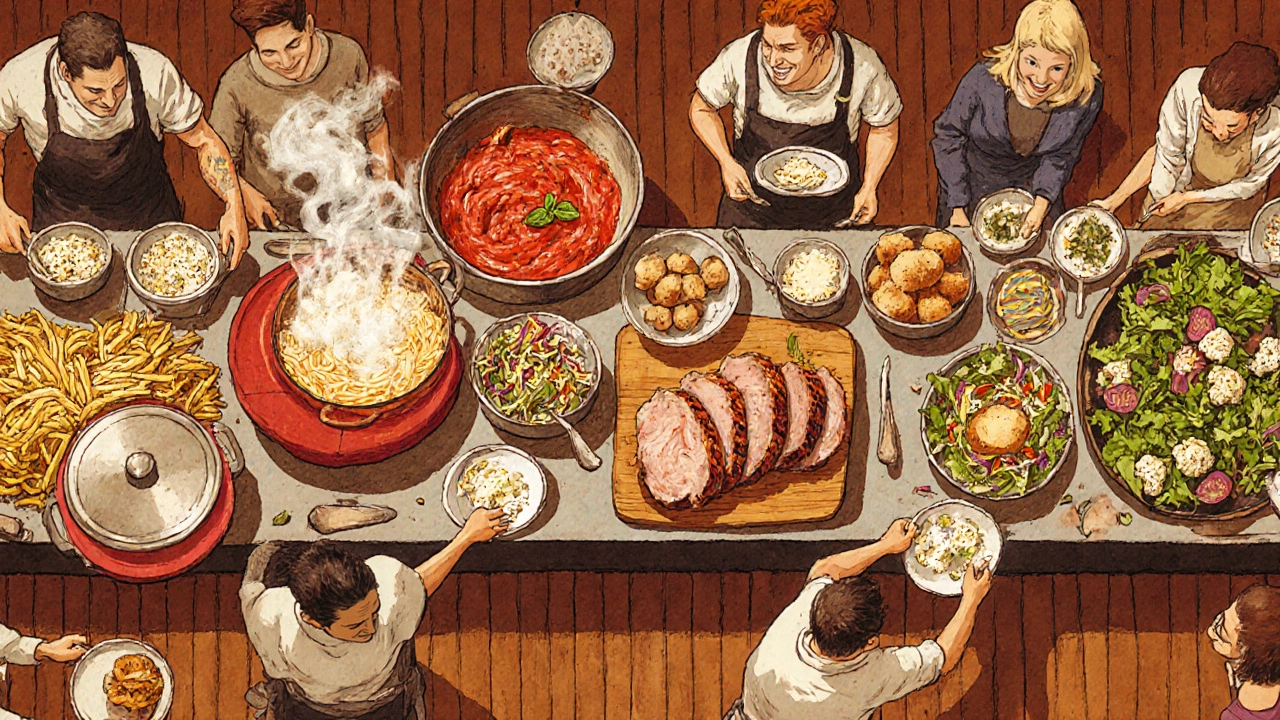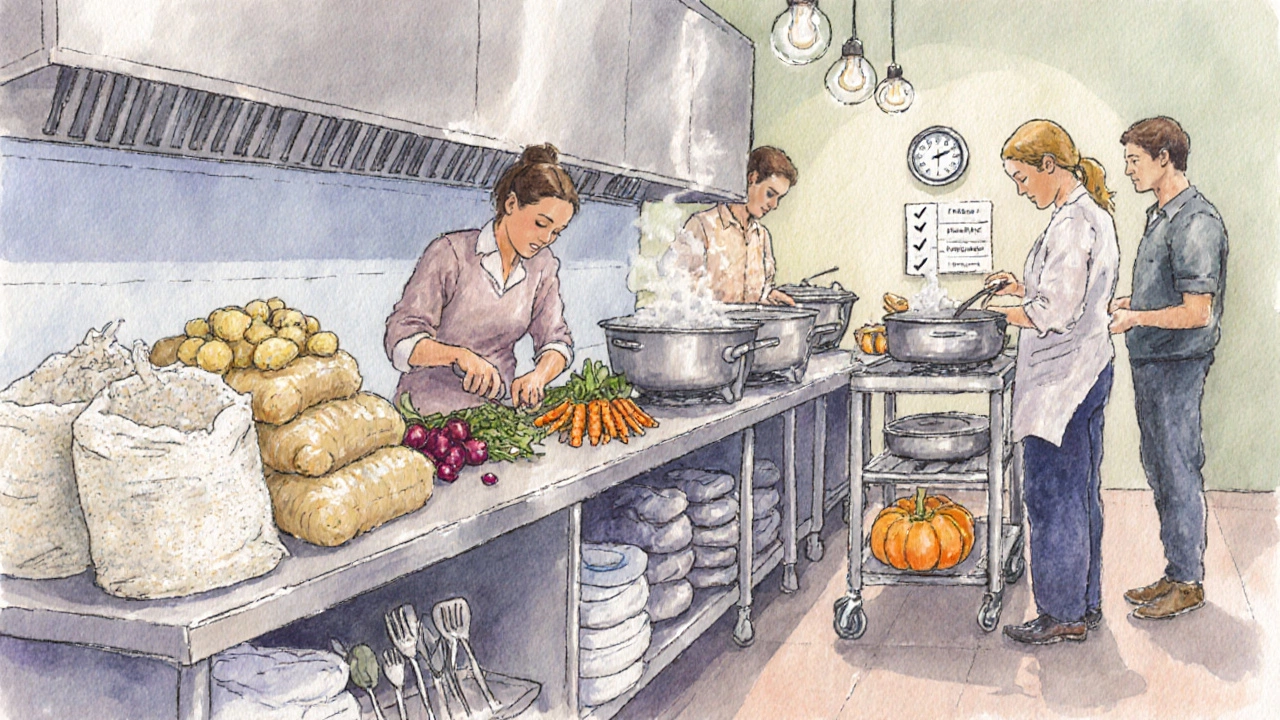Budget-Friendly Ways to Feed 100 Wedding Guests
 Oct, 18 2025
Oct, 18 2025
Wedding Catering Cost Calculator
Estimate Your Catering Costs
Select your service style and ingredients to see how much you can save on feeding 100 guests
Estimated Cost
Note: This calculator uses real cost data from the article. Typical full-service catering costs $70-$120 per person, but our DIY approach can get you down to $7.50 per person.
Picture this: you’ve booked the venue, the dress is perfect, the playlist is set, but the catering bill is staring you in the face like an unwanted guest. Feeding 100 people doesn’t have to drain your savings. Below are proven tactics that let you serve a crowd without breaking the bank.
What Wedding catering means providing food and service for a wedding celebration really costs
Most couples assume a per‑plate price of $70‑$120. In reality, the cost breaks down into three buckets:
- Food ingredients - the raw items you’ll actually eat.
- Labor - chefs, servers, dishwashers, and sometimes a manager.
- Equipment & rentals - chafing dishes, plates, glassware, and linens.
When you can shave a few dollars off any bucket, the total drops dramatically. For example, swapping plated service for a self‑serve Buffet a layout where guests serve themselves from a shared table can cut labor by 30‑40%.
Choose a service style that saves money
Here are four service models ranked by typical cost per head, along with the trade‑offs you’ll face:
| Service Style | Avg. Cost | Prep Time | Equipment Needed | Best For |
|---|---|---|---|---|
| DIY Catering | $25‑$35 | High (you & helpers) | Basic cookware, chafing dishes | Hands‑on couples, tight budget |
| Food truck mobile vendor that serves on‑site | $30‑$45 | Low (truck handles prep) | Minimal - just plates and cutlery | Casual vibe, outdoor venues |
| Catering company professional service with staff and equipment | $55‑$75 | Medium | Full rental package | Stress‑free, formal settings |
| Local Restaurant venue that provides catering off‑site | $60‑$80 | Low (they cook and deliver) | Limited - usually plates only | Foodies who want a themed menu |
Notice the steep drop from a full‑service catering company to a DIY buffet - that’s where you can save the most.
DIY catering: turn friends into sous‑chefs
If you love a hands‑on approach, recruiting family and close friends can be a game‑changer. Here’s a checklist to keep the chaos in check:
- Assign roles early - cooking, plating, serving, and clean‑up.
- Pick a simple menu that can be prepared in large batches (think pasta, roasted chicken, seasonal vegetables).
- Buy in bulk from wholesale clubs or local producers.
- Rent equipment like chafing dishes and warming trays; they’re cheaper than buying.
- Draft a timeline - e.g., prep starts at 8 am, cooking wraps by 2 pm, service begins at 4 pm.
Even with a DIY effort, keep food safety front‑and‑center: maintain hot foods above 140°F (60°C) and cold foods below 40°F (4°C). A digital thermometer costs under $20 and saves you from costly mishaps.
Leverage seasonal produce and bulk buying
Seasonality is your friend. In October, Melbourne offers abundant winter vegetables: carrots, beetroot, cabbage, and pumpkins. These items cost roughly $1‑$2 per kilogram at local farmers’ markets, compared to $4‑$5 at supermarkets.
Buy staples like rice, pasta, and potatoes in 25‑kg bags; the unit price drops to $0.80 per kilogram. Pair them with a protein that’s cheap in bulk, such as chicken thighs ($3.50 per kg) or pork shoulder ($4 per kg). A simple menu could look like:
- Roasted pumpkin and beet salad with a honey‑mustard dressing.
- Slow‑cooked chicken thigh in rosemary‑garlic sauce.
- Herbed buttered noodles.
- Seasonal fruit crumble for dessert.
All of these dishes can be prepared ahead, reheated efficiently, and served family‑style.

Food stations: the stylish, low‑cost alternative to plated meals
Instead of a full buffet line, set up a few themed stations. Guests gravitate toward stations, which spreads out the serving load and reduces the number of waitstaff you need.
Three popular stations that work for 100 guests:
- Pasta Bar - offer two sauces (tomato basil and creamy mushroom) with toppings like grilled veggies, shredded cheese, and olives.
- Protein Corner - a slow‑roasted pork shoulder, carved on‑site, plus a vegetarian option like roasted cauliflower steaks.
- Salad & Bread Station - mixed greens, seasonal veggie slaw, and assorted artisanal breads.
Each station needs a small heat source and a couple of volunteers, cutting labor costs by half compared to a full‑service buffet.
Partner with local businesses for discounts
Many Melbourne cafés, delis, and specialty bakers will give you a bulk discount if you place a large order ahead of time. Here’s how to negotiate:
- Explain your event size and budget constraints.
- Offer to cross‑promote them on your wedding website or social media.
- Ask if they can provide surplus items (e.g., extra pastries) at a reduced price.
- Confirm that they can meet food‑safety regulations for off‑site service.
For example, a local bakery might normally charge $5 per mini‑tart, but for a 100‑guest order they could drop to $3.20 each, saving you $180 on desserts alone.
Skip non‑essential extras
It’s tempting to add a champagne tower or a fancy charcuterie board, but those items quickly balloon the budget. Substitute with affordable alternatives:
- Replace a champagne toast with a sparkling wine or non‑alcoholic sparkling juice.
- Swap imported cheese for a locally sourced, aged cheddar.
- Offer a simple fruit platter instead of an elaborate butterfly‑shaped arrangement.
These small changes can shave $300‑$500 off the total without anyone noticing.

Sample budget breakdown for 100 guests
Below is a realistic snapshot based on a DIY buffet with seasonal produce, a couple of food stations, and a local bakery for desserts.
| Item | Cost (AUD) | Notes |
|---|---|---|
| Bulk chicken thighs (30 kg) | $105 | $3.50/kg, cooked with herbs |
| Seasonal vegetables (potatoes, carrots, beetroot - 50 kg total) | $80 | Farmers’ market bulk pricing |
| Pasta & sauces | $60 | Two sauces, includes cheese topping |
| Bread & rolls | $45 | Local bakery, bulk discount |
| Dessert - mini fruit crumble (120 pieces) | $140 | Bakery partnership |
| Equipment rental (chafing dishes, serving trays) | $120 | Two‑day hire |
| Staff (2 casual servers) | $150 | Half‑day rate |
| Miscellaneous (condiments, disposables) | $50 | Paper plates, napkins |
| Total | $750 | ≈ $7.50 per head |
This $750 example translates to roughly $7.50 per guest, a fraction of the typical $70‑$120 range, yet still offers a satisfying and elegant meal.
Quick checklist before the big day
- Confirm all food suppliers are licensed and can provide a Food Safety Certificate.
- Do a full‑scale trial run of at least one dish two weeks prior.
- Label every dish for allergens (nuts, dairy, gluten).
- Prepare a backup plan for weather if you’re serving outdoors.
- Assign a point person to handle any last‑minute kitchen issues.
With a solid plan, you’ll keep stress low and guests happy.
Frequently Asked Questions
Can I serve hot food without a professional kitchen?
Yes. Use large insulated carriers, chafing dishes with Sterno fuel, and keep a thermometer handy. Many couples successfully run a DIY buffet from a rented kitchen or even a spacious backyard.
How far in advance should I book a food truck?
At least 3 months. Food trucks have limited slots, especially for weekends, and they’ll need time to plan menus and logistics for 100 guests.
What are the best low‑cost dessert options?
Mini fruit crumbles, brownie bites, or a simple lemon drizzle cake cut into bite‑size squares. Baking them yourself or partnering with a local bakery for bulk discounts keeps costs under $2 per piece.
Do I need a liquor licence for a wedding?
If you serve alcohol through a licensed venue or hire a professional bar, the venue’s licence covers you. For DIY alcohol service, you must apply for a temporary licence from Victoria’s liquor authority.
How can I keep food waste low?
Estimate portions using the 1‑2‑3 rule (1 serving of protein, 2 sides, 3 small bites). Offer leftovers to guests in sealed containers; many couples donate excess food to local charities.